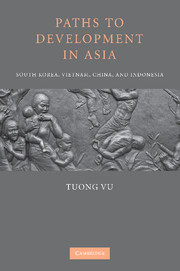Book contents
- Frontmatter
- Contents
- List of Tables and Figure
- Acknowledgments
- List of Abbreviations
- 1 State Formation Dynamics and Developmental Outcomes
- PART ONE DIVERGENT NATIONAL PATHS OF STATE DEVELOPMENT
- PART TWO VARIANTS OF ACCOMMODATION: VIETNAM AND INDONESIA COMPARED
- 6 Organizing Accommodation in Vietnam: Coalition Government, United Front, and Leninist Party
- 7 Organizing Accommodation in Indonesia: Parliament and Status-Based Parties
- 8 Talking Accommodation in Vietnam: Nation, the People, and Class Struggle
- 9 Talking Accommodation in Indonesia: Nation, the People, God, and Karl Marx
- 10 Rethinking Developmental States
- References
- Index
6 - Organizing Accommodation in Vietnam: Coalition Government, United Front, and Leninist Party
Published online by Cambridge University Press: 04 August 2010
- Frontmatter
- Contents
- List of Tables and Figure
- Acknowledgments
- List of Abbreviations
- 1 State Formation Dynamics and Developmental Outcomes
- PART ONE DIVERGENT NATIONAL PATHS OF STATE DEVELOPMENT
- PART TWO VARIANTS OF ACCOMMODATION: VIETNAM AND INDONESIA COMPARED
- 6 Organizing Accommodation in Vietnam: Coalition Government, United Front, and Leninist Party
- 7 Organizing Accommodation in Indonesia: Parliament and Status-Based Parties
- 8 Talking Accommodation in Vietnam: Nation, the People, and Class Struggle
- 9 Talking Accommodation in Indonesia: Nation, the People, God, and Karl Marx
- 10 Rethinking Developmental States
- References
- Index
Summary
Among the macropatterns of state formation and development in six national cases considered in Part I, the accommodation path taken by Vietnam and Indonesia in the 1950s involved elite compromise and mass incorporation. We have seen that the outcomes in these cases were states lacking cohesive structures. Under these circumstances, the Vietnamese and Indonesian state elites implemented developmental policies only to see them backfire (as in Vietnam) or suffer defeat (as in Indonesia).
Part II probes further into the dynamics inside the nationalist movements that founded these states. The goal is to understand how accommodation became institutionalized in political organizations and in elites' discursive formulations. Political organizations and discourses that embodied accommodation can be shown to be incoherent in particular ways that reflected the particular politics of each country. To some extent, the chapters in Part II revisit points raised earlier in Part I, but a narrower focus on the accommodation path here will allow more nuanced accounts of the historical contexts and the thoughts of political actors during state formation. Most importantly, by looking at the subnational level, the analysis of organization and discourse adds causal-process observations to the macroaccounts offered in Part I.
The organizations of the Vietnamese movement, including the coalition government, the Viet Minh united front, and the political parties, are the subject of this chapter.
- Type
- Chapter
- Information
- Paths to Development in AsiaSouth Korea, Vietnam, China, and Indonesia, pp. 131 - 156Publisher: Cambridge University PressPrint publication year: 2010

